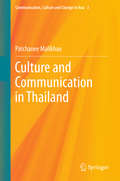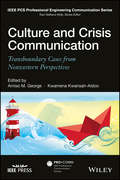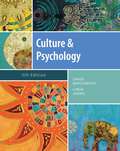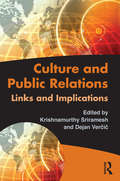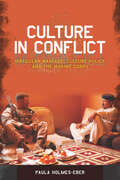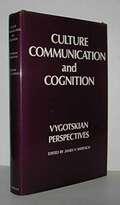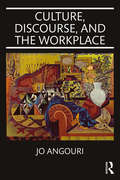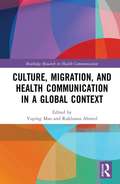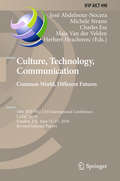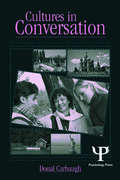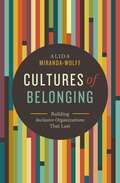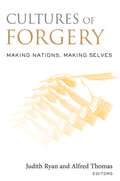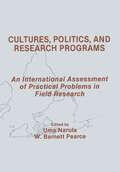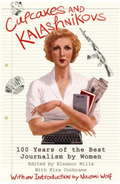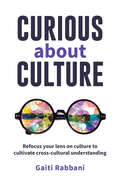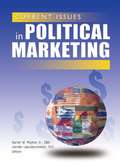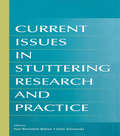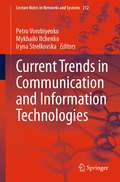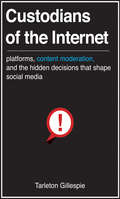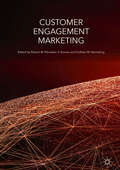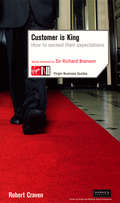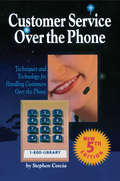- Table View
- List View
Culture and Communication in Thailand (Communication, Culture and Change in Asia #3)
by Patchanee MalikhaoThis book features research papers that examine a host of contemporary issues in Thailand. Coverage includes culture, gender violence, tourism, human trafficking, environmental and ecological issues, sustainability and the sufficiency economy, the (mis)handling of elephants, and more. It features a sociological and anthropological perspective with a dash of communication for sustainable social change. The papers investigate the various phases of communication technology and its impact on cultural change in the country. They explore the use of social networks and privacy issues as well as ethical journalism in the contexts of Thai Buddhism, Thai culture, and other enabling environmental factors. The contributors focus on documentary research of both quantitative and qualitative data on Thai social change as a consequence of globalization and digital technology. They first provide a general overview of social media and communication in the country. Next, the authors go on to explore the specifics of digital communication. This includes a look at its impact on the various ways of Thai communication given politico-economic and religious influences.
Culture and Crisis Communication: Transboundary Cases from Nonwestern Perspectives
by Amiso M. George Kwamena Kwansah-AidooA collection of case studies from nonwestern countries that offers an analysis of the significant role culture plays in crisis communication Culture and Crisis Communication presents an examination of how politics, culture, religion, and other social issues affect crisis communication and management in nonwestern countries. From intense human tragedy to the follies of the rich, the chapters examine how companies, organizations, news outlets, health organizations, technical experts, politicians, and local communities communicate in crisis situations. Taking a wider view than a single country’s perspective, the text contains a cross-cultural and cross-country approach. In addition, the case studies offer valuable lessons that organizations that wish to operate or are operating in those cultures can adopt in preparing and managing crises. The book highlights recent crisis events such as Syria’s civil war, missing Malaysia Flight MH370, andJapan’s Fukushima Daiichi nuclear power plant disaster. Each of the case studies examines how culture impacts communication and responses to crises. Authoritative, insightful, and instructive, this important resource: Analyzes how nonwestern cultures respond to crises Covers the role of culture in crisis communication in recent news events Includes contributions from 18 international authors who provide insight on nonwestern culture and crisis communication Written for communication professionals, academics, and students, Culture and Crisis Communication presents an insightful introduction to the topic of culture and crisis communication and then delves into illustrative case studies that explore intra-cultural and trans-boundary crisis communication.
Culture and Psychology (5th Edition)
by David Matsumoto Linda JuangThis book puts psychological theories and concepts into a cross-cultural framework that invites readers to discover, question, and ultimately, understand the relationship between culture and psychology through exploration of topics like changing gender roles, sexuality, self-esteem, aggression, personality, and mate selection.
Culture and Public Relations: Links And Implications (Routledge Communication Series)
by Dejan Verčič Krishnamurthy SrirameshCulture and Public Relations explores the impact of culture – societal and organizational – through the global lens of public relations. Structuring the volume around three themes -- culture as an environment for public relations; the culture of PR globally; and the impact of PR on culture -- the editors bring together compelling discussions on such questions as how spirituality, religion, and culture have affected public relations, and how public relations culture has been affected by the "corporate cultures" of business enterprises. Additionally, the volume provides studies on the effect of culture on public relations practice in specific countries. With contributors from Europe, Asia, Australia, and North America, this collection offers international perspectives on a topic that is growing increasingly important in public relations study and practice. It is required reading for scholars, researchers, and students in public relations and also has much to offer the business discipline, for those seeking to integrate culture and communication to their practices.
Culture in Conflict: Irregular Warfare, Culture Policy, and the Marine Corps
by Paula Holmes-EberIn response to the irregular warfare challenges facing the U. S. in Iraq and Afghanistan in 2005, General James Mattis#151;then commander of Marine Corps Combat Development Command#151;established a new Marine Corps cultural initiative. The goal was simple: teach Marines to interact successfully with the local population in areas of conflict. The implications, however, were anything but simple: transform an elite military culture founded on the principles of "locate, close with, and destroy the enemy" into a "culturally savvy" Marine Corps. Culture in Conflict: Irregular Warfare, Culture Policy, and the Marine Corps examines the conflicted trajectory of the Marine Corps' efforts to institute a radical culture policy into a military organization that is structured and trained to fight conventional wars. More importantly, however, it is a compelling book about America's shifting military identity in a new world of unconventional warfare.
Culture in Conflict: Irregular Warfare, Culture Policy, and the Marine Corps
by Paula Holmes-EberIn response to the irregular warfare challenges facing the U. S. in Iraq and Afghanistan in 2005, General James Mattis#151;then commander of Marine Corps Combat Development Command#151;established a new Marine Corps cultural initiative. The goal was simple: teach Marines to interact successfully with the local population in areas of conflict. The implications, however, were anything but simple: transform an elite military culture founded on the principles of "locate, close with, and destroy the enemy" into a "culturally savvy" Marine Corps. Culture in Conflict: Irregular Warfare, Culture Policy, and the Marine Corps examines the conflicted trajectory of the Marine Corps' efforts to institute a radical culture policy into a military organization that is structured and trained to fight conventional wars. More importantly, however, it is a compelling book about America's shifting military identity in a new world of unconventional warfare.
Culture, Communication And Cognition: Vygotskian Perspectives
by James V. WertschCulture, Communication, and Cognition: Vygotskian Perspectives
Culture, Discourse, and the Workplace
by Jo Angouri*SHORTLISTED FOR THE 2019 BAAL BOOK PRIZE* Culture, Discourse, and the Workplace brings new theoretical and methodological insights to the complex relationship between language, culture, and identity in professional settings. Examining the politics of language use at work via a critical sociolinguistic approach, this book: Utilises three case studies from institutional and business contexts to provide a unique illustration of participants’ roles and ways of negotiating membership within the business meeting; Questions essentialist meanings of culture and the ways in which they constitute a powerful resource for employees to perpetuate or challenge the status quo in their professional setting; Includes a core section on methodology for the workplace discourse researcher as well as a section dedicated to FAQs and a worked example on data analysis; Provides future directions for workplace sociolinguistics as a field and makes a case for holistic research and multidisciplinary enquiry. Culture, Discourse, and the Workplace constitutes a key resource for students and teachers of intercultural communication and ESP and will also be of significant interest to researchers in the fields of workplace studies and business interaction.
Culture, Migration, and Health Communication in a Global Context (Routledge Research in Health Communication)
by Yuping Mao Rukhsana AhmedBoth international and internal migration brings new challenges to public health systems. This book aims to critically review theoretical frameworks and literature, as well as discuss new practices and lessons related to culture, migration, and health communication in different countries. It features research and applied projects conducted by scholars from various disciplines including media and communication, public health, medicine, and nursing.
Culture, Technology, Communication. Common World, Different Futures: 10th IFIP WG 13.8 International Conference, CaTaC 2016, London, UK, June 15-17, 2016, Revised Selected Papers (IFIP Advances in Information and Communication Technology #490)
by Charles Ess José Abdelnour-Nocera Michele Strano Maja Van der Velden Herbert HrachovecThis volume constitutes the refereed post-conference proceedings of the 10th IFIP WG 13. 8 International Conference on Culture, Technology, and Communication, CaTaC 2016, held in London, UK, in June 2016. The 9 revised full papers were carefully reviewed and selected from 22 submissions. The papers explore the intersections between culture, technology, and communication, applying different theoretical and methodological perspectives, genres, and styles. They deal with cultural attitudes towards technology and communication, interaction design, and international development.
Cultures in Contact: Studies in Cross-cultural interaction
by Stephen BochnerAlthough dated, this text presents research regarding cross-cultural interaction.
Cultures in Conversation (Routledge Communication Series)
by Donal CarbaughCultures in Conversation introduces readers to the ethnographic study of intercultural and social interactions through the analysis of conversations in which various cultural orientations are operating. Author Donal Carbaugh presents his original research on conversation practices in England, Finland, Russia, Blackfeet County, and the United States, demonstrating how each is distinctive in its communication codes--particularly in its use of symbolic meanings, forms of interaction, norms, and motivational themes. Examining conversation in this way demonstrates how cultural lives are active in conversations and shows how conversation is a principal medium for the coding of selves, social relationships, and societies. Representing 20 years of research, this volume offers unique insights into the ways social interactions not only gain shape from, but also are formative of cultures. It makes a significant contribution to communication scholarship, and will be illuminating reading in courses focusing on cultural communication, language and social interaction, intercultural pragmatics, and linguistics.
Cultures of Belonging: Building Inclusive Organizations that Last
by Alida Miranda-WolffClear, actionable steps for you to build new values, experiences, and perspectives into your organizational culture, infusing it with the diversity, inclusion, and belonging employees need to feel accepted, be their best selves, and do their best work.Bypass the faulty processes and communication styles that make change impossible in so many other organizations; access these practical tools and ideas for increasing diversity, equity, and inclusion (DEI) in your company.Filled with actionable advice Alida Miranda-Wolff learned through her own struggles being an outsider in a work culture that did not value inclusion, and having since worked with over 60 organizations to prioritize DEI initiatives and all the value and richness it adds to the workplace, this roadmap helps leaders:Learn why creating an environment where everyone feels belonging is the new barometer for employee engagement.Develop an understanding of the key terms around DEI and why they matter. Assess where your organization is today.Define and take the small steps that build new muscle memory into an organizational culture.Increase employee engagement, collaboration, innovation, communication, and sense of belonging.Build confidence in how to solve future DEI-related challenges.Get buy-in from colleagues (and even resisters) who can clearly see how to move forward and why.Overcome any limiting work environment and build all new processes and communication priorities that allow your employees to be a part of something greater than themselves while your organization learns to value and embrace the unique experiences and perspective that each employee brings to the company.
Cultures of Forgery: Making Nations, Making Selves (CultureWork: A Book Series from the Center for Literacy and Cultural Studies at Harvard)
by Judith Ryan Alfred ThomasIn Cultures of Forgery, leading literary studies and cultural studies scholars examine the double meaning of the word "forge"-to create or to form, on the one hand, and to make falsely, on the other.
Cultures, Politics, and Research Programs: An International Assessment of Practical Problems in Field Research (Routledge Communication Series)
by Uma Narula W. Barnett PearceA compilation of authoritative reports from seasoned researchers working in eight different countries on five continents, this volume examines the concept that conditions of local feasibility are constitutive of research practices not simply obstructions to the realization of an ideal. The result documents the effects of political and cultural factors on research projects and offers culturally sensitive researchers a wealth of practical knowledge.
Cupcakes and Kalashnikovs: 100 Years Of The Best Journalism By Women
by Naomi Wolf Eleanor MillsMany female journalists came to the fore during the first and second world wars, and their perspective was very different to that of their male peers, who were reporting from the field. Specifically, they often wrote about war from the perspective of those left at home, struggling to keep the household afloat. And with 'How it feels to be forcibly fed' (1914) by Djuna Barnes, one of the world's very first experiential, or 'gonzo' journalists, came a new age of reporting.Since then, women have continued to break new ground in newspapers and magazines, redefining the world as we see it. Many of the pieces here feel almost unsettlingly relevant today -- the conclusions Emma 'Red' Goldman drew in her 1916 'The social aspects of birth control', Maddy Vegtel's 1930s article about becoming pregnant at 40, Eleanor Roosevelt's call for greater tolerance after America's race riots in 1943. Many have pushed other limits: Naomi Wolf's Beauty Myth brought feminism to a new generation; Helen Fielding's Bridget Jones caused a media revolution; Ruth Picardie's unflinchingly honest column about living with cancer in 1997 brought a wave of British candour and a host of imitators; and when two iconic women come face to face, we have at one end Dorothy Parker on Isadora Duncan (1928) and at the other Julie Burchill on Margaret Thatcher (2004). This collection of superlative writing, selected by the Sunday Times's most senior female editor, brings together the most influential, incisive, controversial, affecting and entertaining pieces of journalism by the best women in the business. Covering: War; Crime; Politics & Society; Sex & Romance; Body Image & Health; Family, Friendship & Birth; Emancipation & Having it All; Hearth & Home; Icons & Interviews. Including: Lynn Barber, Djuna Barnes, Julie Burchill, Angela Carter, Marie Colvin, Jilly Cooper, Joan Didion, Margaret Drabble, Helen Fielding, Zelda Fitzgerald, Kathryn Flett, Martha Gellhorn, Nicci Gerrard, Emma Goldman, Germaine Greer, Nicola Horlick, Erica Jong, Jamaica Kincaid, India Knight, Christina Lamb, Daphne du Maurier, Nancy Mitford, Suzanne Moore, Camille Paglia, Sylvia Pankhurst, Dorothy Parker, Allison Pearson, Ruth Picardie, Erin Pizzey, Eleanor Roosevelt, Zadie Smith, Susan Sontag, Gloria Steinem, Martha Stewart, Mary Stott, Jill Tweedie, Rebecca West, Zoe Williams, Jeanette Winterson, Naomi Wolf.
Cupcakes and Kalashnikovs: 100 years of the best Journalism by women
by Eleanor MillsMany female journalists came to the fore during the first and second world wars, and their perspective was very different to that of their male peers, who were reporting from the field. Specifically, they often wrote about war from the perspective of those left at home, struggling to keep the household afloat. And with 'How it feels to be forcibly fed' (1914) by Djuna Barnes, one of the world's very first experiential, or 'gonzo' journalists, came a new age of reporting.Since then, women have continued to break new ground in newspapers and magazines, redefining the world as we see it. Many of the pieces here feel almost unsettlingly relevant today -- the conclusions Emma 'Red' Goldman drew in her 1916 'The social aspects of birth control', Maddy Vegtel's 1930s article about becoming pregnant at 40, Eleanor Roosevelt's call for greater tolerance after America's race riots in 1943. Many have pushed other limits: Naomi Wolf's Beauty Myth brought feminism to a new generation; Helen Fielding's Bridget Jones caused a media revolution; Ruth Picardie's unflinchingly honest column about living with cancer in 1997 brought a wave of British candour and a host of imitators; and when two iconic women come face to face, we have at one end Dorothy Parker on Isadora Duncan (1928) and at the other Julie Burchill on Margaret Thatcher (2004). This collection of superlative writing, selected by the Sunday Times's most senior female editor, brings together the most influential, incisive, controversial, affecting and entertaining pieces of journalism by the best women in the business. Covering: War; Crime; Politics & Society; Sex & Romance; Body Image & Health; Family, Friendship & Birth; Emancipation & Having it All; Hearth & Home; Icons & Interviews. Including: Lynn Barber, Djuna Barnes, Julie Burchill, Angela Carter, Marie Colvin, Jilly Cooper, Joan Didion, Margaret Drabble, Helen Fielding, Zelda Fitzgerald, Kathryn Flett, Martha Gellhorn, Nicci Gerrard, Emma Goldman, Germaine Greer, Nicola Horlick, Erica Jong, Jamaica Kincaid, India Knight, Christina Lamb, Daphne du Maurier, Nancy Mitford, Suzanne Moore, Camille Paglia, Sylvia Pankhurst, Dorothy Parker, Allison Pearson, Ruth Picardie, Erin Pizzey, Eleanor Roosevelt, Zadie Smith, Susan Sontag, Gloria Steinem, Martha Stewart, Mary Stott, Jill Tweedie, Rebecca West, Zoe Williams, Jeanette Winterson, Naomi Wolf.
Curious About Culture: Refocus your lens on culture to cultivate cross cultural understanding
by Gaiti RabbaniWhether you are on a journey of self-reflection or wish to influence others, this definitive guide to cross-cultural engagement will help you to understand your own cultural narrative and better connect with people of other cultural backgrounds.Curious about Culture by Gaiti Rabbani invites readers on a journey of introspection to discover the multitude of cultural influences that shape their view of the world.Culture is not geographically bound. It is about more than just where you were born and where you live. Gender, generation and language, among other factors, all contribute to your cultural lens and how well you can connect with others.Improving cross-cultural engagement starts with understanding yourself. You will uncover your own cultural drivers that will help you cultivate meaningful cross-cultural conversations. We all have multiple facets to our identities and some of them are likely to be stigmatised. The author encourages readers to be curious and dive beyond the apparent cues when engaging across cultures, highlighting the pitfalls of drawing upon assumptions and defaulting to stereotypes.Anecdotes from the leading cultural intelligence specialist, Gaiti Rabbani's rich personal and professional experiences along with research-based insights, create a relatable, insightful and thought-provoking read. Whether you are on a journey of self-reflection or wish to influence others, this book will help you to understand your own cultural narrative and better connect with people of other cultural backgrounds.Curious about Culture is a practical reference for the enterprising and curious professional.
Current Issues in Political Marketing
by Jennifer Lees-Marshment Walter W Wymer JrExplore the increased need for marketing within the political arenaCurrent Issues in Political Marketing presents up-to-date theory and research findings from academics working in political science, advertising, and management, and guidance from successful practitioners who know what it takes to make a nonprofit organization stand out i
Current Issues in Stuttering Research and Practice
by Nan Bernstein Ratner John TetnowskiThis state-of-the art volume is a follow-up to the 1999 publication, Stuttering Research and Practice: Bridging the Gap, edited by Nan Ratner and E. Charles Healey. Like its predecessor, the current book is an edited collection of the presentations from the American Speech-Language-Hearing Association’s Annual Leadership Conference in Fluency and Fluency Disorders. Among the topics covered are evidence-based practice, impact of the self-help and support groups, meta-analyses of selected assessment and intervention programs, current theories of stuttering, and the predicted path of stuttering intervention in the future. The authoritative representation of contributors offers the reader the most up to date presentation of fluency issues, with a special emphasis placed on the practical clinical implications of fluency assessment, treatment, and evolving theories of the disorder. The book is written for fluency specialists and graduate students in programs of fluency disorders. It will also be valuable for the clinicians who wish to upgrade their skills in treating fluency disorders.
Current Trends in Communication and Information Technologies (Lecture Notes in Networks and Systems #212)
by Mykhailo Ilchenko Petro Vorobiyenko Iryna StrelkovskaThis book highlights the most important research areas in Information and Communication Technologies as well as research in fields of telecommunication system characteristics at the physical level, deep discussion of telecommunication traffic and its performance indicators, studying of information systems technological parameters, review of public and special applications of information technologies. The book includes strictly selected results of the most interesting scientific research presented at the 10th International Conference “Infocommunications – Present and Future” (IPF’2020) that was held in Odesa, Ukraine. The respective chapters share in-depth and extended results in these areas with a view to resolving practically relevant and challenging issues including: 1. research of telecommunication system characteristics at the physical level: the discussion of various aspects of the signal transmission quality indicators analysis for solving practically important issues in telecommunication systems; 2. research of telecommunication traffic and its performance indicators: the significant aspects of research for forecasting of services characteristics of telecommunication systems; 3.research of information systems technological parameters: the discission of some effective technological solutions that can be used for the implementation of novel systems; 4. research of public and special applications of information technologies: the discussion of the various aspects of scientific and educational applications, etc. These results can be used in the implementation of novel systems and to promote the exchange of information in e-societies. Given its scope, the book offers a valuable resource for scientists, lecturers, specialists working at enterprises, graduate and undergraduate students who engage with problems in Information and Communication Technologies as well as Radio Electronics.
Custodians of the Internet: Platforms, Content Moderation, and the Hidden Decisions That Shape Social Media
by Tarleton GillespieA revealing and gripping investigation into how social media platforms police what we post online—and the large societal impact of these decisions Most users want their Twitter feed, Facebook page, and YouTube comments to be free of harassment and porn. Whether faced with “fake news” or livestreamed violence, “content moderators”—who censor or promote user†‘posted content—have never been more important. This is especially true when the tools that social media platforms use to curb trolling, ban hate speech, and censor pornography can also silence the speech you need to hear. In this revealing and nuanced exploration, award†‘winning sociologist and cultural observer Tarleton Gillespie provides an overview of current social media practices and explains the underlying rationales for how, when, and why these policies are enforced. In doing so, Gillespie highlights that content moderation receives too little public scrutiny even as it is shapes social norms and creates consequences for public discourse, cultural production, and the fabric of society. Based on interviews with content moderators, creators, and consumers, this accessible, timely book is a must†‘read for anyone who’s ever clicked “like” or “retweet.”
Customer Engagement Marketing
by V. Kumar Robert W. Palmatier Colleen M. HarmelingThis book provides a synthesis of research perspectives on customer engagement through a collection of chapters from thought leaders. It identifies cutting-edge metrics for capturing and measuring customer engagement and highlights best practices in implementing customer engagement marketing strategies. Responding to the rapidly changing business landscape where consumers are more connected, accessible, and informed than ever before, many firms are investing in customer engagement marketing. The book will appeal to academics, practitioners, consultants, and managers looking to improve customer engagement.
Customer Is King: How to Exceed Their Expectations
by Robert CravenUpdated eBook editionWhat happens to your customers when you do business with them? Customer is King helps you to approach the problem from the point of view of the clients and work towards the level of customer satisfaction that makes them come back to you again and again.Practical and packed full of easy-to-understand advice, you'll find:* checklists and worksheets* case studies of real businesses* frequently asked questions
Customer Service Over the Phone: Techniques and Technology for Handling Customers Over the Phone
by Stephen CosciaExceptional customer service is crucial to a successful phone-based business. Quality service can secure customer loyalty, while poor service can lose it. This concise guide examines various important scenarios that a customer service representative is likely to encounter and shows how to best handle each situation. This guide also explains how to make effective use of voice mail, email, fax, and letters.
